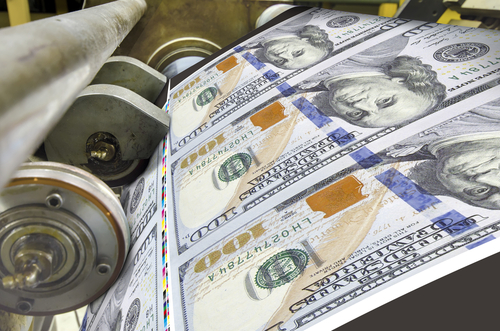Wednesday Wealth Recap
- Federal Reserve data shows that more than half of American households have a negative net worth. It’s easy to point fingers at a “broken” capitalist system, but what’s really to blame? Alexander Green has the answer.
- Algorithmic trading has taken over Wall Street, and true believers would argue that it’s the future of investing. But, Nicholas Vardy explains why artificial intelligence is not all it’s cracked up to be.
- Bitter partisanship in Washington has brought the threat of a government shutdown back to the forefront of investors’ minds. Chief Trends Strategist Matthew Carr breaks down what a shutdown could mean for the market and your retirement.
Note from Senior Managing Editor Christina Grieves: Inflation is absolutely skyrocketing, and investors are rightfully worried. That’s why I reached out to our friend and colleague Marc Lichtenfeld – The Oxford Club’s Chief Income Strategist – to get his thoughts. As you can read below, Marc offers some excellent, concrete steps you can take to maintain your buying power as inflation looms.
But this ticking inflation time bomb necessitates bringing out the big guns. That’s why Marc has produced a far more expansive presentation, teaming up with Larry Kudlow to break down exactly what this means for investors. And Kudlow’s credentials are impressive: host of his own show on Fox Business, director of the National Economic Council under President Donald Trump, former chief economist and senior managing director of Bear Stearns, and associate director for economics and planning under President Ronald Reagan.
Remarkable, right? That’s why I really think you’ll want to hear what he and Marc have to say in their Inflation Emergency Broadcast. If you’re one of the 60 million Americans whose retirement accounts are in serious danger, this special broadcast is for you. Simply click here to watch their urgent message and learn from the experts themselves how to protect your financial future!
As a child of the ’70s, I was very aware of inflation, even if it didn’t seem to affect me directly. I don’t remember the price of a pack of baseball cards or a Marathon bar soaring.
But it was in the news all the time. People seemed to be upset by it. I had more important things to worry about – like hoping to see some Yankees in my new pack of baseball cards.

Today, inflation is at one of the highest points it’s been in my adult life, which spans 30-plus years.
From 1992 through 2020, per the consumer price index, U.S. inflation rose above the annual historical average of 3.2% only three times, reaching a high of 3.8% in 2008. Each time it eclipsed the average, it fell the following year.
Today, inflation stands at 5.3%, and I expect it to head much higher.
We have a perfect storm of events and policies that should shoot prices significantly upward, including…
- Government spending. The government plans on spending trillions more in the next few years. Regardless of what budget or bills get passed, the economy will be sloshing around with newly printed dollars. All that money chasing limited goods and services will drive prices higher.
- Zero interest rates. The accommodative policy of the Fed makes borrowing money dirt-cheap and adds to the spending frenzy going on right now.
- The pandemic. The lockdown created pent-up demand for goods and services. And while things were closed, Americans saved cash and paid down debt. Now, like their elected officials, they’re going back to spending money like a spoiled teenager with rich parents.
- Supply chain constraints. Due to labor shortages and other issues, there are not enough raw materials, finished products and available services, limiting the supply of those goods and services as demand surges. That is inflationary.
At some point in the next 12 to 24 months, I would not be surprised to see a spike in inflation to the high single digits or perhaps even higher. Those kinds of numbers would greatly erode your buying power – so you need to prepare for it now.
Here are three actions you can take…
No. 1: Own Perpetual Dividend Raisers.
These are stocks that raise their dividends every year.
If you’re receiving more income from your dividend stocks each year, you should be able to maintain and hopefully increase your buying power instead of seeing it decay due to inflation.
No. 2: Keep fixed income maturities short term.
You don’t want to be locked into a fixed income product for years.
If you’re earning 4% today and inflation hits 6% or 8% in the next year, you’re losing buying power. If your maturities are short, you’ll be able to reinvest the cash as it matures at higher rates.
No. 3: Look for variable-rate products.
There are some bonds whose rates are variable depending on inflation or other factors. Those will help you maintain your buying power as inflation rises.
Perhaps the best thing I could have done to beat inflation was to have hung on to those baseball cards. But since Reggie Jackson can’t help me, I’m taking the steps mentioned above to make sure rising prices don’t destroy my buying power.
Good investing,
Marc
